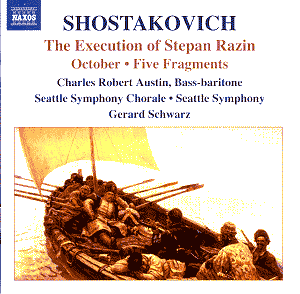Gerard Schwarz is,
in many ways, an unrecognized conductor.
In his work with the Seattle Symphony
on Delos, he has recorded much of the
twentieth century American symphony.
Bernstein is rightly revered for his
premieres, but Schwarz has worked his
way, at a very high level of quality,
through broad swathes of the catalogue.
His recordings of Howard Hanson’s symphonies,
or his championing of the work of Hovhaness,
to take just two examples, are indispensable.
Yet he has also done good work in more
standard repertoire. I have valued recordings
of Stravinsky, Richard Strauss and Haydn
under his baton.
Naxos is now re-releasing
some of these recordings. I was excited
to see a recording of Shostakovich’s
The Execution of Stepan Razin —
if this was previously available, I
missed it at the time. This is a great
work that has been served very poorly
on disc. They - the Russians, I suppose
- don’t make basses of the vocal variety
like they used to. The bass soloist
is the lynchpin in any performance of
this orchestral cantata. The original
Melodiya recording with Kondrashin conducting
and bass Vitaly Gromadsky remains the
unsurpassed benchmark. I was fortunate
that, in the early days of the Internet,
a fellow listserv member sent me a cassette
copy of this, which I held onto until
my tape player was consigned to the
dustbin of technological history. Why,
oh why, won’t somebody take control
of the Melodiya archives and institute
a coherent plan to make this and other
treasures available?
If you appreciate Shostakovich’s
13th symphony, then Stepan
Razin will be a must-hear, must-have
work. Both a bass soloist delivering
texts of Yevtushenko, accompanied by
orchestra. The story of the folk-hero
Stepan Razin, a Cossack rebel who challenged
the power of the Tsar, operates, like
much of Shostakovich’s work, on at least
two levels. On the first, it is good
Socialist Realism: a representative
of the people against entrenched powers.
On the second level, however, it is
possible to identify Stalin himself
with the oppressive Tsar. I actually
prefer the cantata to the symphony:
it has more unity of purpose and thus,
more impact. Beyond personal evaluations,
though, both are necessary works for
the admirer of Shostakovich.
The primary competition
to this recording comes from Polyansky’s
recording on Chandos, with Anatoly Lochak
as soloist. (Chandos, CHAN 9813, coupled
with a good performance of the 6th
Symphony.review
) Charles Robert Austin sounds, surprisingly,
more Russian than does Lochak. By this
I mean that Austin’s voice has a greater
depth and resonance. He sounds at home
in the idiom. Lochak’s lighter voice
possesses alternate virtues: he works
the text. At moments he sounds like
he is telling you a raunchy story; at
others, likely he is truly emitting
a battle cry. At the end of the day
I think both are important approaches
to the work. There are at least three
other recordings on CD. I am not familiar
with Janowski (Capriccio 10780). Andreev
(Koch 3-7017-2) and Slovák (Praga
PR 254 055) feature singing and orchestral
work far inferior to Schwarz and Polyansky.
The other two works
on the Naxos recording can be considered
filler. October is an exciting
and evocative symphonic poem that receives
a lot of good performances — this is
one. The Five Fragments are more
at the level of ephemera. The notes
indicate that they served as practice
for the 4th Symphony. As
a result, they will be of interest to
the Shostakovich completist.
Until we get a reissue
of Kondrashin’s recording, or another
at its level of skill and inspiration,
the recordings by Schwarz and Polyansky
are ones we can live with. Their differences,
particularly in vocal execution, reflect
interpretive differences significant
enough that I would recommend getting
both. The Naxos disc, being the cheaper
of the two, would be a great place to
start. The notes provide the cantata’s
text in transliterated Russian and in
English.
Brian Burtt


